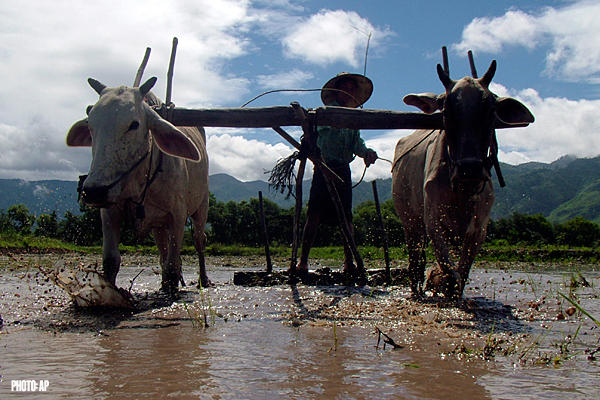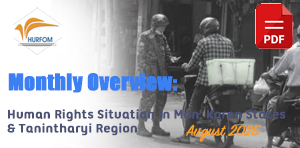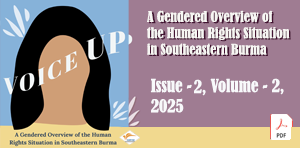Examination and Critique of the 2012 Farmland Bill
May 29, 2012
Analyzing the Pyi Daung Su Hluttaw Law No.11, 2012
The Farmland Law was enacted and approved by Burma Pyi Daung Su Hluttaw (Burma Union Parliament) on March 30th, 2012.
 According to the Farmland Law section 3 (a), “farmland means paddy land, ya land, kiang land, shifting-cultivated land (taung ya), perennial plant land, dhani (coastal) land, orchards, and alluvial land.”
According to the Farmland Law section 3 (a), “farmland means paddy land, ya land, kiang land, shifting-cultivated land (taung ya), perennial plant land, dhani (coastal) land, orchards, and alluvial land.”
Under section 3 (b), “farmland means the land which is mainly for boosting agricultural production, and producing naturally growing or man-made products that can be cultivated with an irrigation system.”
Analysis: Because farmland is defined as land primarily for the growth of agricultural production, it is an obstacle for the farmers to cultivate their land freely. It gives the right to cultivate agricultural crops solely for the purpose of agricultural production. [Download PDF Version of Farmland Bill in Burmese]
Under section 3 (d), it states that “the Right to Use Farmland” means “the State is the ultimate owner of all land and thus farmland is provided to develop agricultural products in accordance with prescribed conditions. However, the extraction of natural resources above and below the ground such as gems, mineral, petroleum and gas are not included in the provision.”
Analysis: The farmers are allowed to cultivate farmland, but it is owned by the State. The farmers and the farm workers have no right to own the farms, and by definition, the government authorizes the farmers to use the land. In accordance with the Law, farmers who own farms are essentially considered the same as hired workers. It is as if the government’s role is that of a landlord, and is the same as when kings controlled the land during the feudal era — owning the entire country’s land.
Analysis: Farmers are not permitted to access resources “above or below” the land, affording the sole ownership of and profits from abundant natural resources to the government.
Section 12 (b) of the Farmland Law states that “everyone having the right to use the farmland has to pay a farming (or sharecropping) tax and other taxes as assessed by the Ministry.”
Analysis: The farming tax and other taxes are equivalent to paying rent. The farmers are paying rent directly to the landowner, in this case, President Thein Sein’s government. During British colonization, farmers had to pay exorbitant sharecropping fees. How meaningful is “independence” when farmers still have to pay taxes on farmlands? This system of exacting rent should be abolished.
Section 12 (f) states that “the specific area/size and use of farmland shall not be permitted without the consent and agreement of the Farmland Management Body.”
Analysis: Under the government of each military generation, farmers have had to get permission and agreement from the Farmland Committee before using the land. The Farmland Management System has not changed, and the Law’s restrictions are getting tighter.
Under section 12 (g), “the farmland shall not be used for any other means without permission.”
Analysis: This section prevents the farmers from working on and using the farmland freely.
Under section 12 (h), “any other kinds of crops shall not replace the original crops grown without permission.”
Analysis: In order to compete in the economic market, farmers must not be prevented from producing new or different crops. It is essential for farmers to have the right to cultivate and produce freely based on market demand in order to increase their profitability and diminish the country’s high levels of poverty. Growth that improves the farmers’ standard of living should not be constricted. Farmers should have the freedom to cultivate any kind of crops and the right to freely store, process, transport, and distribute the products.
Section 3 (d) concerning conditions and definitions states, “Farmer/agriculturist means any person who is in compliance with any one of the following conditions:
(i) Who is or was engaged in agriculture or livestock breeding or both as his principal means of livelihood (or);
(ii) Supervises the land use for agriculture or livestock breeding or both as his principal means of livelihood at the time stated in the agreement;
(iii) Invests capital and engages directly or supervises in the production of seasonal crops, orchard, perennial crops or commercial livestock breeding as his principal means of livelihoods (or);
(iv) Engaged in agriculture or livestock breeding;
(v) Using farmland for producing or breeding and selling of sapling, seed, and products for agriculture production and livestock breeding purposes;
Analysis: According to the conditions, individuals who supervise crops or livestock breeding for business purposes, Burmese investors, or management personnel can be considered farmers.
Analysis: News media has reported on the people who meet the definition of “farmer” and they include government officials, senior generals and their relatives, tycoons, landlords, and foreign investors. The classification of “farmer” means individuals can be given confiscated land from which to reap profits. President Thein Sein’s government appears to be benefitting from a feudal-style system.
Under section 34 regarding Farmland Management, “the Central Body of Vacant, Fallow and Wilderness Land Management states that if the vacant, fallow, and wild lands are designated for agriculture and livestock breeding, and the land has been prepared for producing crops, those lands shall be changed into/become farmland.”
Analysis: The government is prepared to designate any land in the country as “farmland” in order to claim confiscation rights.
Section 10 of Vacant, Fallow, and Wilderness Land Management Amendment Bill, “the central committee stated that regarding agricultural products, it can grant 50,000 acres of land to cultivate perennial crops, not more than 3,000 acres of land to grow
orchard crops, and 50,000 acres of land to cultivate seasonal crops for industrial raw materials.”
Analysis: Individuals in the USDP-led Thein Sein government, its crony companies, and foreign investors can each own up to 50,000 acres of land.
Farmland Bill section 35 states, “Anyone who fails to comply with an issued eviction-order shall be sentenced to a minimum of 2 months and a maximum of 6 months in prison, with a fine of at least 300,000 Kyat and at most 500,000 Kyat.”
Section 37 states other crimes may be punished as, “the person shall be sentenced at most 3 years and a fine of not less than 1,000,000 Kyat.”
Analysis: The government is using the farmland system to intimidate and imprison farmers instead of protecting them.
Under the last section of the Farmland Bill, section 43, the following laws are effectively repealed:
1) Land Nationalization Act, 1953
2) Tenancy Law, 1963
3) Law Safeguarding Peasant Rights, 1963
Analysis: These repealed laws include some prescriptions and conditions that are beneficial to farmers and the country, but they are not addressed in the newest Farmland Law. The disadvantages of this new Law will not only cause conflict but may also turn into protests.
Under section 38, “Labor organizations are permitted to be founded”. And, under section 3 (j), “The [labor] organization shall be a union that is established in accordance with the prescribed/enacted law and for the help of regional economic development.”
Analysis: According to section 3 (j), it is doubtful that labor organizations truly benefitting farmers will be permitted. The laws do not grant full freedom to establish unions and are designed to only assist with “economic development.” These restrictions are similar to previous limitations that were placed on unions and reflect past lessons and experiences.
For the farmers, it is recommended that they set up a Farmer’s Union in accordance with their own values and goals. If the farmers are unable to found the Union publicly, they can found one underground. In some cases, farmers have founded a Union as half-public and half-underground. Just as it was in the previous generation’s farmer revolution, today the farmers’ best chance to ensure cooperation and trust is through the support of and alliance with a political party that will stand firm and champion their interests. [Download PDF Version of Farmland Bill in Burmese]
Comments
Got something to say?
You must be logged in to post a comment.



















































